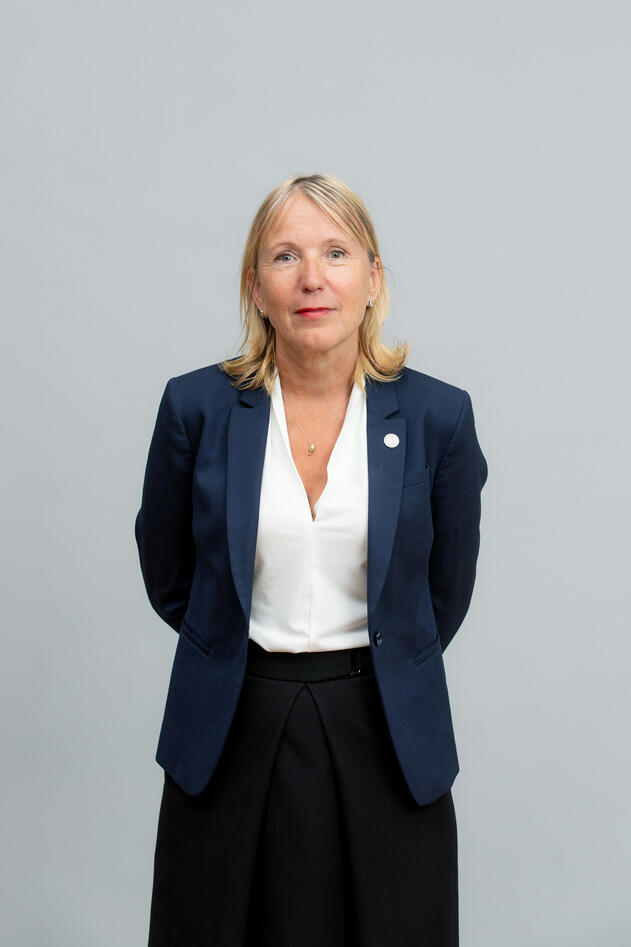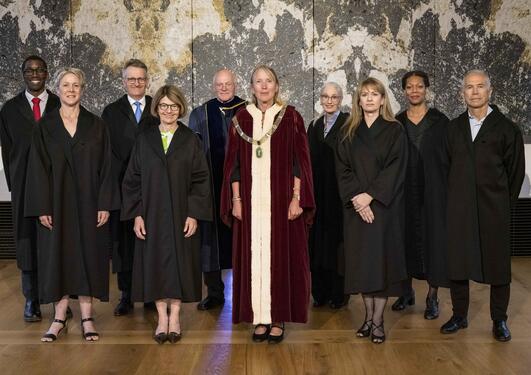Dr. Anne Larigauderie awarded honorary doctorate
Anne Larigauderie, Executive Secretary of the Intergovernmental Platform on Biodiversity and Ecosystem Services (IPBES), has been awarded an honorary doctorate at the University of Bergen.

Main content
In December, it was announced that Anne Larigauderie is one of the recipients of an honorary doctorate at the University of Bergen (UiB).
Dr. Larigauderie has been awarded the honorary doctorate for, amongst other achievements, her central role in building up and facilitating the Intergovernmental Platform on Biodiversity and Ecosystem Services (IPBES). IPBES was established to strengthen the science-policy interface for biodiversity and ecosystem services for the conservation and sustainable use of biodiversity, long-term human well-being and sustainable development. It has a similar role for knowledge about nature as the Intergovernmental Panel on Climate Change (IPCC) has for climate.
When you give nature a chance, a difficult situation can quickly be reversed. However, in order to do that, decision-makers must have the knowledge they need to take the right measures
The state of knowledge
As the Executive Secretary for IPBES Larigauderie believes it’s important to facilitate collaboration and knowledge sharing across professional fields, national borders and cultures. This is vital for the professional community of international researchers associated with IPBES.
IPBES' work is important for political processes and decision-makers worldwide, in addition to contributing to an informed public debate. An example from 2019 is the IPBES Global Assessment Report on Biodiversity and Ecosystem Services, a report based on around 15.000 scientific publications.
“One conclusion that received a lot of attention from this report is that around one million animal and plant species are now being threatened with extinction. This struck a nerve around the world, as it tells something about the magnitude of the problem - and the consequences it could have if we don’t change course”, Larigauderie says.
Another example of how IPBES' work is an important part of major diplomatic processes, took place in December 2022, when 196 nations, after demanding negotiations, signed the Kunming-Montreal Global Biodiversity Framework (KM-GBF).
The agreement - which is heavily based on the science and frameworks provided by IPBES - acknowledge and incorporate societal transformation as a necessary prerequisite to solve global environmental crises. Since the necessary knowledge had already been provided, the discussions at the summit were not about facts, but rather about political solutions and compromises in order to be able to agree on a framework.
More awareness of biodiversity
In the past, Larigauderie has worked at several academic institutions in the USA and Europe (more info in the fact box), and she has particularly researched how climate change will affect plant physiology and ecology in various contexts. She is pleased to say she has noticed a change in the amount of attention given to the topic of biodiversity over the years.
“My impression is that we are moving in the right direction. Ten years ago there was not much awareness of biodiversity. Climate had come on the radar, but biodiversity was far down on the agenda. Today I believe that there is greater awareness of this topic, and I also believe that the work of IPBES has played a role here”, she says, and adds:
“But there is still a long way to go, especially when it comes to balancing a sustainable approach to biodiversity and various economic interests. Another big challenge is to agree on the most important questions and priorities globally, as the situation differs greatly in various parts of the world”.
Give nature a chance
What drives Larigauderie is her passion for nature, the work to highlight how reliant we are on biodiversity, and being an advocate for the crucial role science has in solving the challenges we face.
“It is also important for me not to discourage people in discussions about biodiversity. The good thing about biodiversity is that when you give nature a chance, a difficult situation can quickly be reversed”, she says.
“However, in order to do that, decision-makers must have the knowledge they need to take the right measures. In our work to promote this knowledge, we really appreciate the support we are receiving from people all over the world”.
Ceremony in the University Aula in May
UiB rector Margareth Hagen is looking forward to celebrating Larigauderie and her work during the honorary doctorate ceremony in the University Aula in May.
“Anne Larigauderie has been central since IPBES' inception in 2012. She has been instrumental in IPBES becoming as agenda setting as it has become, and ensured that it gained a broader focus, by seeing the threats to natural diversity in the context of societal challenges, different values, and perspectives from indigenous peoples and from local communities”, says Hagen, and adds:
“In recent years, IPBES and the Intergovernmental Panel on Climate Change have collaborated closely, and clearly communicated that the climate crisis and the nature crisis are connected, and must be solved in conjunction. IPBES has been essential in highlighting the understanding that nature is the basis for a good society”.

